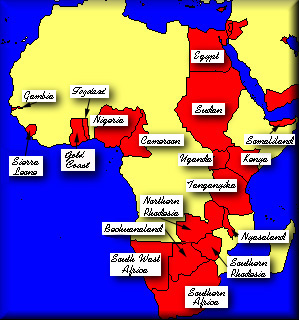Cricket: The Sport of Empire
Cricket: n., & v.i. Open-air game played with balls, bats, & wickets, between two sides of 11 players each.
Concise Oxford Dictionary of Current English, 5th Edition.11
Colonialism: n., (freq. derog.) alleged policy of exploitation of backward or weak peoples.
Concise Oxford Dictionary of Current English, 5th Edition.2
Descriptions of cricket, found throughout the literature of the late 19th and early 20th centuries are filled with the language of idealism: cricket was a noble game, a manly game. Cricket embodied the British virtues of strength, persistence, courage, healthy rivalries, camaraderie, and sportsmanship. Cricket was a respectable game, a Gentlemanís game.
In 1871, a London journalist and cricket enthusiast named Frederick Gale lamented that the famous lexicographer Dr. Samuel Johnson did not define cricket in his dictionaries. Gale took the liberty of suggesting what a conversation between Johnson and his biographer, Boswell, might have looked like, if the topic had indeed arisen. Johnsonís imaginary description for Boswell ran like this:

|
"Sir, cricket is a manly game, demanding exercise of patience and temper, combined with some danger, and therefore requiring courage. The two men at the wickets are viceroys, who alternately rule each otherís kingdom, and the space between the batsmanís wicket and the popping crease, though it be but four feet in extent, is as much the batsmanís kingdom, so long as he can hold his fortress, which is called a wicket, as Ireland is the Lord Lieutenantís. The laws of the game are just and reasonable as the laws of chivalry were, and it is a sport which interests rich and poor, old and young, and promotes good will towards men,í and one which ought to be supported by the bishops and clergy, who can mix sociably with their parishioners on the village green without losing their dignity and self-respect. Sir, if I had been a bishop I should have played cricket."3
|
Gale intended this to be a rather humourous description, but the ideals embedded within it were serious ideals within contemporary Britain. Ruling kingdoms, holding down the fortresses, just and reasonable laws, good will towards men, dignity and self-respect -- Galeís choice of words reveal much about the British mindset of the day. To find such imagery integrated in a description of cricket reveals much of how the British related to the game, and also helps to explain how cricket truly became arguably the most important sport of the British Empire.
The 19th and early 20th centuries were, for Britain and many other economically powerful nations, a time of rapid colonial expansion. Britain, like France, Portugal, Germany, Belgium, Italy and others, vied for colonies all across the world, displacing local systems of rule and implementing British systems. By the time the scramble for colonies had slowed down, there was little doubt that Britain had really come out on top in the race. From the British West Indies to Australia, from South Africa to Somaliland, from India to Canada -- Britain had established an Empire that spanned the globe.
"When people go in large numbers to other countries, and establish colonies there," writes cricket historian Rowland Bowen, "so far from abandoning their social habits and customs, they do their best to maintain them and; not only that, to maintain them in the state they knew when the first substantial number of them arrived in their new homeland."4
This, he explains, is why cricket can be found in various forms all around the world, and most especially in countries which once fell under the banner of the British Empire. By the late 1600s, English settlers had begun to play cricket in New England; the game was first played in Calcutta and Bombay by the early 1700s.
|
In Austalia and New Zealand, cricket was introduced early in the 19th century, and made its first appearance in Cape Town, South Africa with the first British occupation of the Western Cape in the late 18th Century.5
Kenya, Rhodesia (now Zimbabwe), Ceylon, the British West Indies followed suit -- virtually every British outpost soon developed its own cricket establishment.
Today, many countries which once were British colonies are still heavily involved in the international community of cricket, and in fact all 10 full members of the International Cricket Council (ICC) (Australia, Bangledesh, England, India, New Zealand, Pakistan, South Africa, Sri Lanka, the West Indies, and Zimbabwe) have direct links to British colonial history, and are still current members of the Commonwealth. There are 64 other affiliate and associate member countries in the ICC.
|

|